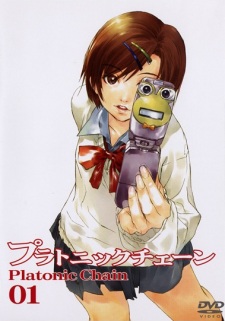
With only three minutes of content per episode, Platonic Chain throws away the idea of a plot and chooses a setting instead; a series of vignettes allow us to experience the world that it has built for us, to decide if and how we could fit in with its vision of Japan, one that is very much like Japan today except for one drastic change. A website called Platonic Chain allows you to access all the data in the world, from search histories to security camera footage to sensitive private information (imagine the ability for anyone to discover your 3-sizes!), all for free. Here, the show waves its hands over the detail of how this came to be, simply saying “a hacker”. Is this really important? Frankly, no, although in some ways the fact that Platonic Chain is illegal is noteworthy. This major alteration is not a societally accepted change, and in the first few episodes it takes everyone by surprise. But as time moves forward, it becomes an integral part of the lives of the youth of Shibuya, who play the characters in the vignettes. This is crucial: as an illegal site, it starts off as a tight secret, almost like a rumor, and its breeding ground is the center of youth culture in Japan, where guys go around trying to hit on every girl in their path while the girls speak in valley girl accents about their new boyfriends, their style, and any gossip around. And interestingly enough, even with the power that Platonic Chain provides, nothing really changes.
We experience this new Shibuya through the eyes of Hitomi, a nosy girl with little interest in finding romance, her best friend Rica, a ganguro (dark-skin) with a penchant for falling in love every few minutes, and an eccentric shut-in named Kanae. It starts with Hitomi sending Rica the link to Platonic Chain, and subsequently meeting Kanae through it by coincidence. They spy on their friends, perfect everything from diets to soul mates, and catalogue every moment of their lives. Yet despite the show providing drastic examples of the power of unlimited information and data, such as making a message out of the lighted windows at a hotel or tracking down a pop idol who was never captured on film, their lives follow a fairly normal trajectory for young girls living in Shibuya, almost identically to how many live their lives today. This does not seem unintentional either; in one humorous episode, Rica berates her boyfriend by reading off every promise he has ever broken based on data downloaded from Platonic Chain, only to find out that she had accidentally downloaded the data for her ex instead.
The creators are making a statement about the future of technology and data. In the right hands Platonic Chain is a tool that allows virtually any incident to go exactly according to plan, even when there is seemingly no way for any technology to make such plans work. But at the same time, with everyone having access to this tool, the norm only shifts slightly. Boys are still wandering the streets picking up girls, people breakdance in the parks, and girls hide their rings when approached by new guys. Everyone acts as if there were nothing watching them, even when their actions leave a permanent print online. And while it can be hard to relate to an episode based on how Platonic Chain is used to move things forward, the end result is typical, many times obvious before the end even comes. Rather than boring or frustrating, it is immersive to think along the exact same lines as these people, who live in a world of much greater potential than ours.
The least immersive part of the experience, one that can be extremely jarring at times, is the 3D modeling that is used in place of traditional animation. For 2003 it may have been somewhat impressive, but now it can be painful to watch mouths move randomly while arms and fingers flex at awkward angles, and hair appears poking through hats and other objects. Personally I did not mind the modeling, as it felt like an instance of technology out of place in its time, similar to Platonic Chain itself. The show even has a small joke about it, adding the number of polygons used to render each character in their post-episode character biography. By contrast, the opening music is a simple tune with steel drums and keyboard, while the credits have pop songs from the 90s. Amusingly enough, the music seems to be stuck years before the times when this show was airing, let alone the distant future.
With the whole thing comes in little bite-sized packages of a few minutes apiece, Platonic Chain opts to be enjoyable and paint moments in time in a world not as unlike ours at it first seems. From the fashion trends to the department stores, from the pickup artists to the black-skin trend of the 90s, outside of the Platonic Chain website nothing really seems futuristic; no robots, no flying cars, no crazy designs. While the future will certainly look different from today, one thing that is certainly true—something that Platonic Chain is completely aware of—is that we will all adjust to our new surroundings, and in all likelihood we will continue to act much the same as we do today.